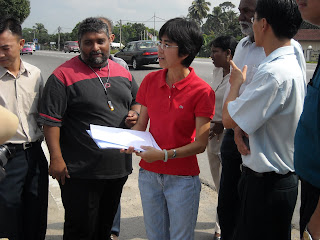.jpg)
Tuesday September 16, 2008
By BARADAN KUPPUSAMY
Parti Sosialis Malaysia vows to stick with its political struggle despite having close ties with Pakatan Rakyat.
SOCIALISM is no longer a dirty word, going by the official recognition given by the Government to the small but vocal Parti Sosialis Malaysia or PSM, which had been operating openly, without fear of prosecution since its formation in 1995.
It had everything – a constitution, formal party leadership, elections and annual congress, a logo, an office and even a regular newsletter – but legally it did not exist.
Even now with Opposition Leader Anwar Ibrahim plotting and planning to capture the government, the PSM was ignored.
“We are not invited. Nobody shares with us ... We are in the dark,” says PSM president Dr Mohd Nasir Hashim.
But all that has changed with official recognition by the Registrar of Societies effective Aug 19.
In fact, the PSM’s final appeal against official rejection by the registrar was still before the Federal Court and coming up for decision in November, when the Government relented and offered registration.
“March 8 changed everything. It forced the Government to face the political realities of the day and allow for greater freedom of political association,” Dr Mohd Nasir said in an interview.
Not only did Home Minister Datuk Syed Hamid Albar recognise PSM, he also allowed registration of the PKR newsletter Berita Keadilan and increased the frequency of PAS’ organ Harakah from a bimonthly to a weekly.
Previously, the Government had refused to register the PSM, arguing that a party founded on the principles of socialism was a danger to national security.
It also objected to the use of the word socialism in the party’s name or logo, equating it with communism, an ideology banned here.
In 1995, in a move to gain public credibility, the old Parti Sosialis Rakyat Malaysia founded in the early 1970s under the leadership of Dr Syed Husin Ali, dropped the word “socialism” to become Party Rakyat Malaysia.
In 2001, Party Rakyat Malaysia disappeared into the Party Keadilan Nasional, the Umno breakaway, which later renamed itself Party Keadilan Rakyat.
Dr Syed Husin, now the PKR deputy president, and newcomers like Tian Chua continue to press for “socialist aims” in ideologically right-wing PKR.
But the 1995 name change had also left behind a disgruntled core of 30 die-hard believers, who decided that another party using socialism was needed to champion the plight of low-paid and exploited plantation and factory workers.
Today, PSM has 10,000 members in seven states for whom the recent recognition is a major psychological boost.
“Our first task now is to consolidate and go on a road show to recruit more members and expand across the country,” said long-time secretary-general S. Arulchel-vam.
In this, it will be aided by the dynamic left-wing tradition it inherited from the 1950s and 60s but which disintegrated in the face of state repression, infighting and defection.
After an absence of nearly 30 years, avowed socialist Dr Jeya-kumar Devaraj entered Parliament, boosting morale among left-wingers.
Asked to define socialism for today, Dr Jeyakumar said it is the ideology that tries to return the nation’s wealth to the people who created it.

 As we planned
As we planned Need to make some safety precautions
Need to make some safety precautions Cars can now turn in
Cars can now turn in






.jpg) Tuesday September 16, 2008
Tuesday September 16, 2008 Pondering their future: (from left) Devi Ganie, Munichy Muniandy, B. Mathialagan and Mariayee Palaniappa of the Semenyih Estate are hoping for permanent homes.
Pondering their future: (from left) Devi Ganie, Munichy Muniandy, B. Mathialagan and Mariayee Palaniappa of the Semenyih Estate are hoping for permanent homes.  Close-knit community: Former estate workers of the Semenyih Estate gather for chats and to strengthen the communal bond.
Close-knit community: Former estate workers of the Semenyih Estate gather for chats and to strengthen the communal bond.  Still backward: Life in the Semenyih Estate and other estates in the country seem untouched by tim.
Still backward: Life in the Semenyih Estate and other estates in the country seem untouched by tim.  Red MyKad: 55-year-old Mariamah Anthony is still a permanent resident
Red MyKad: 55-year-old Mariamah Anthony is still a permanent resident Hoping to break the cycle: Dunedin Estate pensioner Baby Angamuthu with her sevenmonth- old grandson Thinakaran Murugan. Is there hope of a better life for him in the future?
Hoping to break the cycle: Dunedin Estate pensioner Baby Angamuthu with her sevenmonth- old grandson Thinakaran Murugan. Is there hope of a better life for him in the future? 